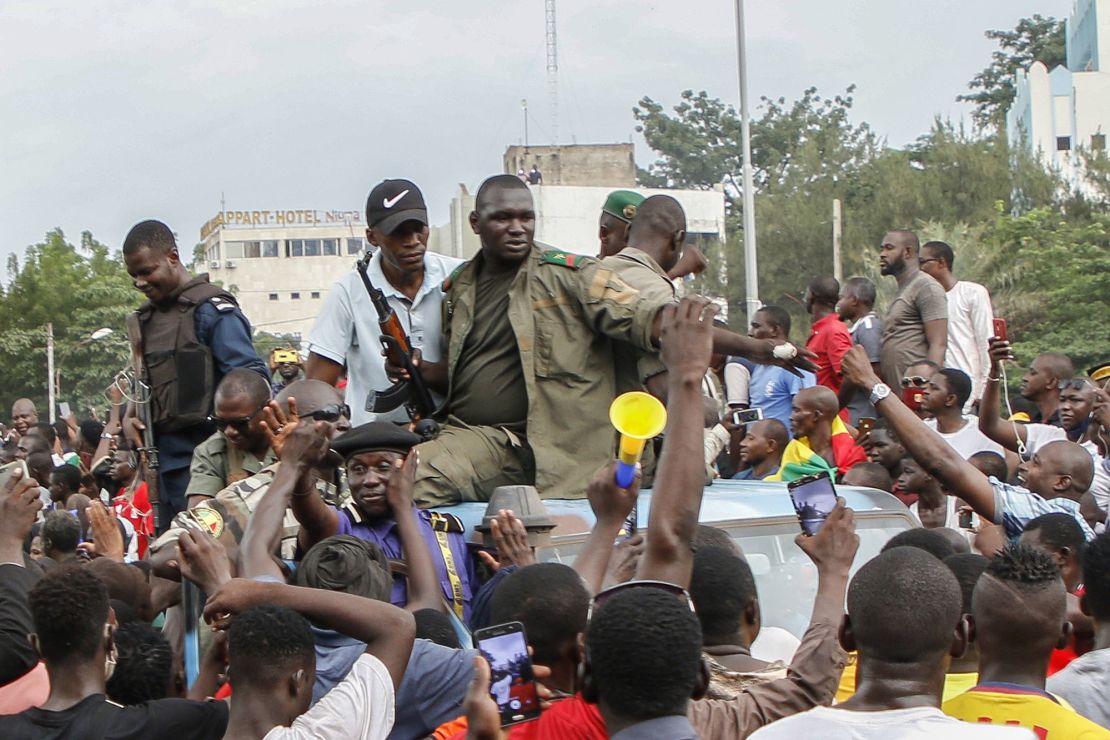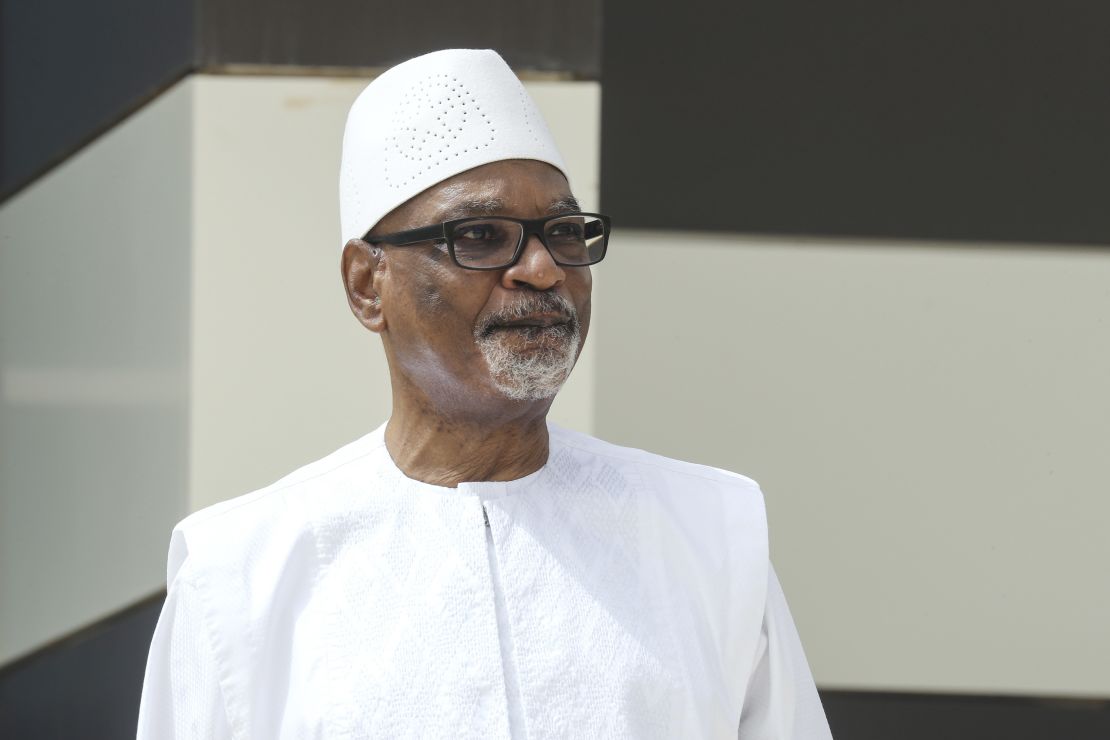A coup in Mali, West Africa, could have ramifications far beyond its borders, threatening to further destabilize across the region and jeopardizing counter-insurgency efforts led by France and the United States.
President Ibrahim Boubacar Keita announced his resignation on state television late Tuesday, hours after he and Prime Minister Boubou Cisse were arrested by mutinous soldiers.
The coup – the latest upheaval in a cycle of turmoil lasting almost a decade – follows months of mass anti-government protests and a worsening insurgency from Islamist militants north of the capital, Bamako.
Mali shares borders with Burkina Faso and Niger, and all three countries have struggled with the growing presence of Islamist groups.
Given the instability in the Sahel region, observers fear that if Mali falls further into chaos, the dominoes will fall hard and fast, potentially unleashing unrest as far afield as coastal west Africa – where the United States has economic and strategic interests – and beyond.

What led to the coup?
Public discontent began growing in May after the country’s top constitutional court overturned the results of a disputed election, paving the way for Keita’s party to occupy a majority of the vacant seats in parliament.
Unhappiness, particularly among young people, has been fueled by poverty, lack of employment and frustration over corruption.
Mali has a young population – around half of the country’s 19 million people are under the age of 18, according to the UN Children’s Fund (UNICEF). And 42.7% of Malians live in extreme poverty, according to the World Bank.
The government has also faced criticism over its inability to quell the ongoing unrest by violent extremists in the country’s north and more remote areas, far from Bamako, despite sustained counter-insurgency efforts by Western and regional powers.
Mali previously faced a major rebellion in 2012, after a coup staged by mid-ranking army officers left the door open for jihadi groups and rebels from the country’s long-marginalized Tuareg ethnic minority the chance to take over a significant part of the country.
Keita, who was elected in 2013 with a mandate to pursue peace, is seen as having squandered the goodwill he initially enjoyed. The peace deal he helped broker did not give all sides a seat at the table, and his government became mired in claims of corruption.

Videos that have circulated online show Malians supporting soldiers as they went through the city, said Nadia Adam, a researcher for the Institute for Security Studies, based in Bamako. “Most Malians think that this is a good thing, this is something they were requesting for a very long time, a couple of weeks, a couple of months even, as shown in the protests in July when they were demanding the resignation of President Keita,” she said. “And that is what they got yesterday.”
Who else is involved in Mali?
France – the former colonial power in Mali – and the United States will both be watching the latest developments with concern.
France has been militarily involved in the country since the 2012 coup. Its efforts went well at first, but what is known as Operation Barkhane is increasingly seen as a long-running drain on resources with no clear end in sight. Eight years on, France is spending close to $1 billion a year on the operation, but has failed to quell the lawlessness in Mali’s border regions.
Meanwhile, the United States’ interest in Mali is dominated by a desire for stability in what is seen as a nexus for Islamist insurgent groups in the Sahel region.
The main US base of operations in the region is in neighboring Niger, seen by Washington as a more stable partner than Mali. From Air Base 201, just outside the city of Agadez, US drones provide aerial support and surveillance to France’s efforts to contain what the US military refers to as a ring of insecurity, focused mainly in Mali and Libya.
US President Donald Trump has threatened to close the $110 million air base and pull back US backing for France’s operation. Paris is lobbying hard to maintain that support as it bolsters its own troop numbers to fight an increase in insurgent activity in the region.
The US has only a limited number of personnel in Mali, who primarily perform counter-terrorism activities with local and international partners.
A UN mission known as MINUSMA has also been in place in Mali since April 2013. As of March 2020, more than 13,500 uniformed personnel were deployed in Mali under its banner. The mission is one of the deadliest overseen by the UN, with more than 200 fatalities to date.
The G5 Sahel, a regional partnership created in 2014, has also been involved in combating security threats in Mali and the wider Sahel region with a force comprising some 5,000 troops from Burkina Faso, Chad, Mali, Mauritania and Niger.
And the Economic Community of West African States, the regional bloc known as ECOWAS, has also sent political mediators to Mali in recent months.
What’s next for Mali?
Street demonstrations in recent weeks were organized by opposition coalition group M5-RFP and its supporters, who called for a transitional government. When government security forces fired on protesters last month, discontent turned to anger.
Mali’s military leaders have said they want to see “credible regional elections” held within a “reasonable timeframe.”
According to analyst Adam, the leaders said they had to intervene to “make sure that the Malians got the treatment that they deserve.”
The coup leaders have not yet nominated the person who will be in charge during the transition period, Adam said. “After we have the road map of what they actually want to do, we are going to have a clearer understanding of what’s going to happen over the next couple of months,” she added.
Influential cleric Mahmoud Dicko, who has been a key voice for the opposition movement, has said he is not interested in a political role.
Colonel Major Ismaël Wagué, a spokesman for the military leaders, listed multiple grievances with Keita’s leadership, including allegations of corruption, patronage, and the failure to deal with Mali’s long-running insurgency.
The geographic and cultural differences between Bamako and the country’s north have always weighed heavy, and helped spark the 2012 upheaval that overthrew former President Amadou Toure.
Armed groups in the north have for years taken advantage of the territory’s remoteness and the lack of any real central government outside of Bamako. Those groups rely on trafficking, drug-running and other criminal activities for funds.
Operations by French and UN forces have helped to prevent them controlling large swathes of territory, but observers fear that a power vacuum in Mali further fueled by the coup and a lack of good governance could help them gain ground.
Will outside powers take action?
The United Nations Security Council is to hold an emergency meeting to discuss the situation on Wednesday, two UN diplomat sources told CNN.
The UN talks were requested by France and Niger, according to the diplomatic sources. The sources spoke on the condition of anonymity, as they were not authorized to speak on the subject.
The African Union Commission’s Moussa Faki Mahamat called on “the mutineers to cease all use of violence” in a statement Tuesday. He asked the international community to oppose any use of force.
Europe will push for a “democratic and constitutional process” in Mali, European Commissioner for Internal Market Thierry Breton, a French national, said Wednesday.
“This is extremely important. There is a constitution, it must be respected,” Breton told French radio station Europe 1. “Mali is an element of stability or destabilization in this complicated Sahel region where France is very involved.”
Observers agree that the key missing link is good governance, which no amount of investment in security will solve.
CNN’s Martin Goillandeau and Richard Roth contributed to this report.








